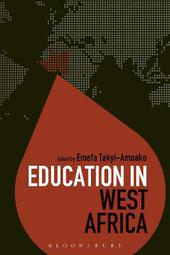
|
Education in West Africa
Paperback / softback
Main Details
| Title |
Education in West Africa
|
| Authors and Contributors |
Edited by Dr Emefa Takyi-Amoako
|
|
Series edited by Dr Colin Brock
|
| Series | Education Around the World |
|---|
| Physical Properties |
| Format:Paperback / softback | | Pages:528 | | Dimensions(mm): Height 234,Width 156 |
|
| ISBN/Barcode |
9781474270618
|
| Classifications | Dewey:370.966 |
|---|
| Audience | | Professional & Vocational | | Tertiary Education (US: College) | |
|---|
|
Publishing Details |
| Publisher |
Bloomsbury Publishing PLC
|
| Imprint |
Bloomsbury Academic
|
| Publication Date |
8 September 2016 |
| Publication Country |
United Kingdom
|
Description
Education in West Africa is a comprehensive critical reference guide to education in the region. Written by regional experts, the book explores the education systems of Benin, Burkina Faso, Cameroon, Cape Verde, Chad, The Gambia, Ghana, Guinea, Guinea-Bissau, Ivory Coast, Liberia, Mali, Mauritania, Niger, Nigeria, Senegal, Sierra Leone and Togo. It critically examines the development of education provision in each country, whilst exploring both local and global contexts. Including a comparative introduction to the issues facing education in the region as a whole, this handbook is an essential reference for researchers, scholars, international agencies and policy-makers at all levels.
Author Biography
Emefa J. Takyi-Amoako is Education, Gender and Research Consultant with a doctoral degree in Comparative and International Education from Oxford University, UK. She is Executive Director of Oxford ATP International Education, UK, and Senior Quality Expert (Higher Education).
ReviewsGiven that too high a percentage of scholarly work on sub-Saharan Africa is produced by non-Africans, the editors of [this book] should be lauded because nearly all the authors are African ... [The book] provide[s] a useful raid on what was largely unarticulated and so help[s] to fill a gap in the scholarly literature. * Zambia Social Science Journal * Education in West Africa is essential reading for anyone concerned about providing all children with quality education. Every researcher working on West Africa will give a vote of thanks for such an invaluable resource. The wealth of essential information about the history of eighteen educational systems is complemented by insightful analyses of how colonial and postcolonial politics shaped their national agendas and their abilities to meet contemporary global development goals. The voices from these countries deserve to be heard. * Madeleine Arnot, Professor of Sociology of Education, University of Cambridge, UK * This is a timely, well-crafted book that comprehensively responds to an urgent need of new ideas and perspectives in the educational terrain in West Africa. Emefa Takyi-Amoako brings together an impressive lineup of both seasoned and emerging scholars who produce a seminal work that achieves a unique regional focus in educational studies. It has the potential to become the main reference work for some time to come and should immediately serve both the research and policy analysis interests of specialized scholars, students, public sector managers and the general public. * Ali A. Abdi, Professor and Head of the Department of Educational Studies, University of British Columbia, Canada * This excellent book uses a multidisciplinary approach and multi-dimensional methodologies to assess the challenges of education in West Africa within the context of globalization. It suggests practical and valuable action-oriented strategies for investing in Africa's future generation, regardless of gender. * Filomina Chioma Steady, Professor of Africana Studies, Wellesley College, USA * This collection of rigorously researched and well-presented papers on the dynamics of educational development in West Africa provides adequate lessons from hindsight (what the countries studied did or failed to do), as well as insight (the complex nature of current challenges) and foresight (future directions) for education in the sub-region. In addition to being a rich mine of information the book is more importantly a methodological guide for the study of a subject that lies at the very heart of sustainable human development. These are the characteristics that make it a resource gold mine for a variety of users - teachers and students, development-oriented researchers, development partners and policy-makers. A yawning gulf has in fact been filled in needed tools for study-research-teaching and forward-looking work on educational development in the targeted sub-region and elsewhere. * Pai Obanya, Emeritus Professor, Institute of Education, University of Ibadan, Nigeria *
|